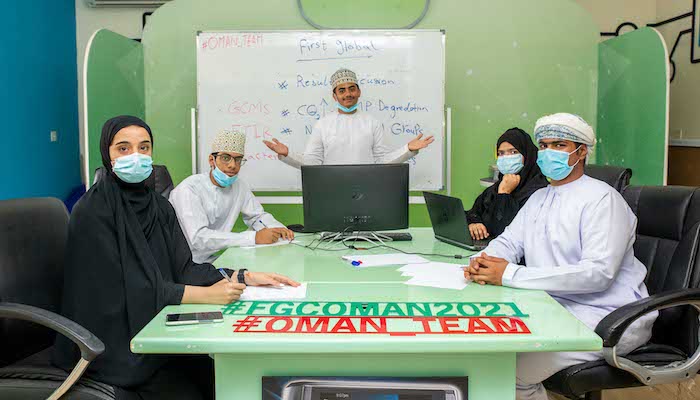
Muscat: A student-teacher team from Oman is competing in a global innovation and robotics challenge, alongside peers from about 170 countries.
The six-member team, supported by two teacher-supervisors, has completed the initial phase of First Global 2021. The three phases comprise the solution, robotics and nanosatellite challenges.
First Global is an annual challenge, and this year's theme for the solution challenge is 'Discover & Recover', in keeping with the struggles of the pandemic. For this phase, teams are required to pick challenges across environmental, health, economic and educational sectors caused by COVID-19.
National youth teams are encouraged to identify problems and design solutions, using science, technology, engineering and mathematics (STEM).
Go green
The Oman team has chosen to focus on an environmental issue for the solution challenge -- the mechanism of microplastics reduction using two eco-friendly methods.
"We looked into the bioremediation of microplastics by microbial mats and studied the ability of these surfaces to change the characteristics and properties of microplastics, simulating field conditions," said team supervisor Sumaya Al Siyabi.
"Microplastic is a water, soil, and air pollutant. The ingestion of microplastics has been observed among a wide range of biota, from microscopic organisms such as zooplankton, to large marine organisms such as pelagic fish, and enter the food chain, often years after plastic waste mismanagement," Asila Al Sinawi, teacher and team supervisor added, on why the team was keen on this subject.
Generation of plastic waste and microplastic pollution is driven chiefly by human activities, such as tourism, and the pandemic made this challenge all the more relevant in Oman, Al Sinawi said.
"During the lockdown, many people chose domestic tourism as an alternative to international travel. While it helped the economy pick up, it has posed environmental challenges," she elaborated.
Robotics design
Samples were collected for the solution challenge using robots built using REV Robotics, a popular tool in the field of robotics. This was part of the robotics challenge.
"It gave us the perfect opportunity for us to understand robotics design, construction, and programming skills," said student member Dana Al Al Baluchi.
All participating teams were provided REV Robotics kits to create solutions for four individual building tasks, rather than assembling a single robot.
International networking
"We interacted with teams from other countries, and formed new friendships. We also exchanged information related to competition and about our country's culture," Mohammed Al Aisari, also a student member, said.
What's next
This networking will come in handy during the next phase.
"Having completed the first phase, we are looking to collaborate with a team from another country for the second phase," Ayham Al Shakiri, a 17-years-old member, said.
This includes the nanosatellite challenge.
"We are waiting impatiently for the arrival of the CubeSat box, which we will use to create a prototype of a modern satellite," fellow member Salah Al Wahibi added.
Sub-challenges
Smaller tasks included creating team portraits, promoting the project on social media and various forms of storytelling.
"We also raised awareness on STEM concepts, the environmental applications of STEM, and how science and engineering plays out in our everyday experiences," Faris Al Sadi, a member from Grade 11, said.
Kindling curiosity
Talks by experts in the fields of health, environment, education, and economy are part of the larger annual challenge.
"These have given us insight about the world even amid the pandemic," Al Sadi added.